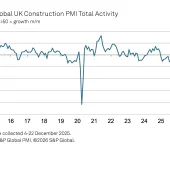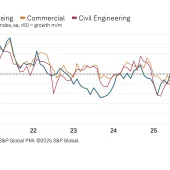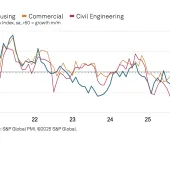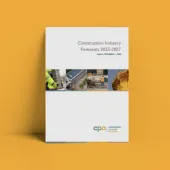New order growth weakest since June 2020
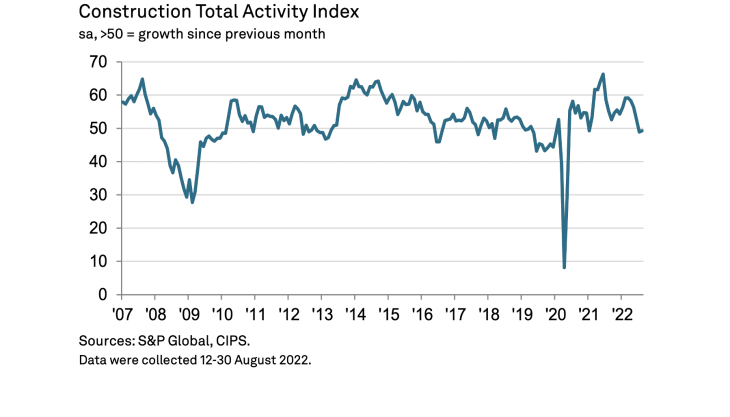
UK construction activity down for second month running; Disruption to supply chain eases
CONSTRUCTION activity in the UK dipped for the second successive month in August as customer demand moved closer to stagnation amid cost pressures and economic uncertainty. Concerns about wider economic prospects led to a drop in business confidence and slower job creation, while firms' purchasing activity declined.
Falling buying activity did alleviate some pressure on supply chains, with lead times lengthening to the least extent in two-and-a-half years, while inflationary pressures also showed signs of waning.
The headline seasonally adjusted S&P Global / CIPS UK Construction Purchasing Managers’ Index (PMI) – which measures month-on-month changes in total industry activity – was at 49.2 in August, up fractionally from 48.9 in July but still below the 50.0 no-change mark and thus signalling a reduction in construction activity over the month. Activity has now decreased in two consecutive months.
As was the case in July, civil engineering posted the sharpest decline in activity of the three monitored categories, seeing output fall markedly over the month. Commercial activity also declined, ending a period of growth stretching back for a year-and-a-half. On a more positive note, activity on housing projects increased for the first time in three months, albeit fractionally.
While some firms increased activity in response to ongoing growth of new orders, this was outweighed by those constructors that saw output decline as firms adjusted to signs of demand weakening.
New orders increased only marginally in August, and to the least extent since June 2020. Some respondents indicated that customers were holding back on committing to new orders amid cost pressures.
Alongside inflationary pressures, concerns around the potential for a wider economic downturn also impacted the sector in August. Business confidence dropped in July and was well below the series average.
Construction firms scaled back their input buying for the first time since the initial wave of the COVID-19 pandemic, again reflecting signs of a slowdown. There were also some reports that less pronounced price and supply pressures reduced the need to build inventories.
The reduction in pressure on suppliers meant that vendor lead times lengthened to the least extent for two-and-a-half years in August.
In line with the picture for supply-chains, there were also signs of inflationary pressures moderating midway through the third quarter. Input costs continued to increase sharply, often due to higher fuel prices, but the rate of inflation softened to the weakest since February 2021.
Andrew Harker, economics director at S&P Global Market Intelligence, who compile the survey, said: ‘The UK construction sector looks set to be in for a challenging period, according to the latest PMI data. Not only did construction activity fall for the second month running, but a range of indicators from the survey pointed to further weakness ahead. New orders slowed to a crawl, while concerns about the sector and the wider economy led to a drop in confidence.
‘Activity weakness was broad-based in August, with none of the three monitored categories immune to the wider slowdown. Commercial activity dropped into contraction for the first time in just over a year-and-a-half, and while housing activity ticked higher, the segment has been in broad stagnation over the past three months.’
Dr John Glen, chief economist at the Chartered Institute of Procurement & Supply, added: ‘There is some consolation for the sector as it readies itself for a future of high energy costs, however. Lower demand is leading to fewer purchases, downward pressure on input costs, and more responsive supply chains. Together, these trends could eventually help to reverse inflation, but a prolonged dip in new orders will be a bitter pill for the sector to swallow.’



